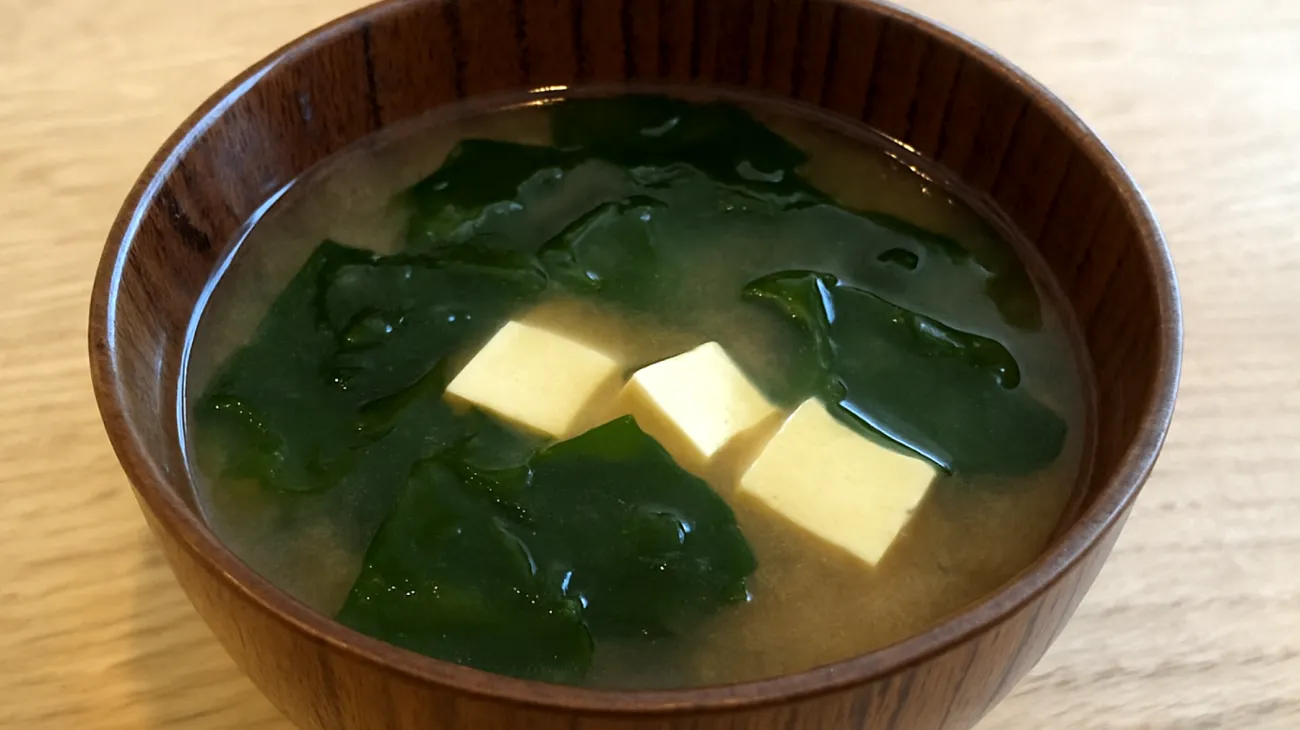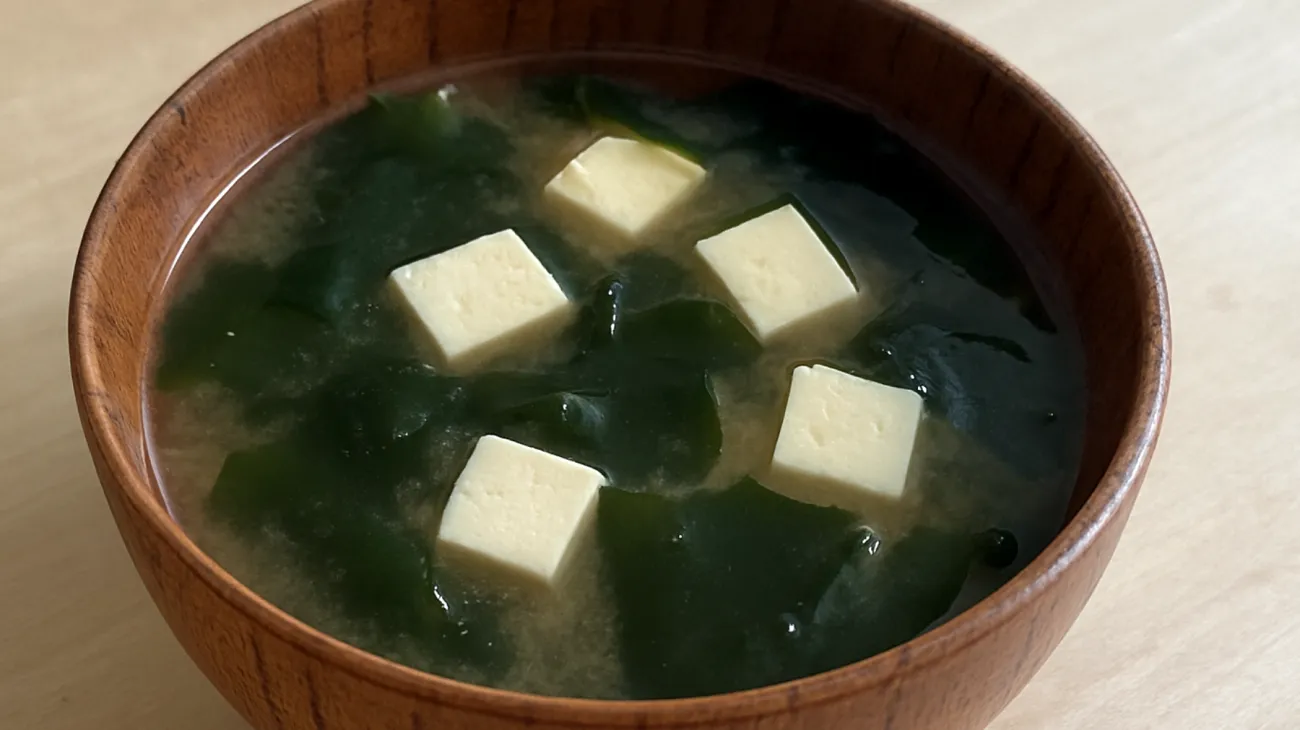The steaming bowl before you holds more than just comfort – it’s a nutritious option that can support your well-being during the demanding challenges of shift work. Miso soup with wakame seaweed and tofu combines traditional Japanese cuisine with practical nutrition, offering a balanced meal for those working irregular hours across the Emirates and beyond.
The Silent Struggle of Shift Work Cognitive Demands
Working against your body’s natural rhythm creates physiological stress that extends beyond simple tiredness. Shift work health risks include potential cognitive challenges and digestive issues, making proper nutrition particularly important for those working irregular schedules. The constant battle against biological clock disruption affects eating habits and overall well-being.
Miso soup delivers a combination of nutrients that can support overall health during these demanding periods. The fermented soybean paste contains B vitamins, including folate, niacin, riboflavin, and thiamine. However, contrary to popular belief, miso isn’t a significant source of vitamin B12 – an essential nutrient that’s virtually absent in unsupplemented plant-based fermented foods. Shift workers following vegetarian or vegan diets should seek reliable B12 sources through fortified foods or supplements rather than relying on miso alone.
Wakame Seaweed: Natural Iodine and Mineral Content
The graceful ribbons of wakame seaweed floating in your soup provide natural iodine, crucial for thyroid function and brain health. Circadian rhythm disruption affects various bodily systems, and maintaining thyroid health becomes even more important during irregular work schedules. Wakame also contains magnesium and potassium, essential minerals for nervous system function.
While iodine sufficiency supports cognitive health, excessive intake from seaweed can be problematic, especially for those with underlying thyroid conditions. Regular consumers of wakame should have their thyroid function monitored, particularly if taking thyroid medications. The mineral content in wakame supports overall health but provides general benefits rather than targeting specific shift work challenges.
Fermentation Benefits and Digestibility
The fermentation process in miso production breaks down certain proteins, potentially improving digestibility. This can be particularly helpful when your digestive system is already stressed from irregular eating schedules. While miso contains probiotics that may support gut health, the direct connection between these benefits and improved shift work performance needs more research.
The bioactive peptides and soy isoflavones present in miso contribute to its nutritional profile, though claims about specific stress adaptation benefits require more scientific backing. What we do know is that fermented foods generally support digestive health, which becomes crucial when maintaining regular meal timing proves challenging.
Tofu: Complete Plant Protein for Sustained Energy
The silky cubes of tofu provide all essential amino acids needed for various bodily functions, including neurotransmitter synthesis. As a complete plant protein, tofu helps maintain stable energy levels when included as part of balanced meals. This consistency becomes particularly valuable during long shifts when energy dips can affect performance and safety.
The protein quality in tofu remains excellent whether consumed alone or with miso. While both foods offer nutritional value, their combination creates a satisfying meal that provides sustained energy. Tofu serves as a versatile, digestible protein source that fits well into various dietary patterns, making it practical for workers with limited meal preparation time.

Practical Implementation for Shift Workers
Miso soup offers genuine practical advantages for consumption during shifts. Its warming nature provides comfort during night work, and preparation in a thermos maintains temperature for extended periods. This convenience factor, rather than unique cognitive benefits, makes it a sensible choice for shift workers seeking nutritious, portable meals.
The liquid format also contributes to hydration needs, which often get overlooked during busy shifts. While water remains your primary hydration source, the warm broth adds variety and can be more appealing than plain water during cold hours.
Preparation Strategy
- Pre-shift preparation: Combine ingredients in a wide-mouth thermos for easy transport and consumption during breaks
- Sodium management: Choose reduced-sodium miso varieties, especially important for cardiovascular health
- Balanced nutrition: Pair miso soup with other foods to ensure adequate caloric intake and dietary variety
- Timing considerations: Consume during natural meal windows when possible to support digestive health
Navigating Potential Considerations
While miso soup can be part of a healthy diet for shift workers, several factors deserve attention. The iodine content in wakame requires caution for those with thyroid conditions. Healthcare providers recommend monitoring thyroid function when regularly consuming seaweed-based foods, particularly for individuals taking thyroid medications.
Sodium sensitivity varies among individuals, making low-sodium miso varieties preferable for those monitoring blood pressure. The probiotic benefits remain intact in reduced-sodium formulations, allowing you to enjoy fermented foods without excessive salt intake. Individual tolerance and medical history should guide consumption patterns.
For vegetarian and vegan shift workers, remember that neither miso nor tofu provides vitamin B12. Reliable supplementation or fortified foods remain essential for preventing deficiency. This becomes particularly important during periods of stress and irregular sleep, when nutritional needs may increase.
Building a Comprehensive Approach
Rather than viewing miso soup as a miracle solution for shift work challenges, consider it one component of a comprehensive nutritional strategy. Focus on overall diet quality, including varied protein sources, adequate hydration, and appropriate supplementation where needed. Regular meals, even during irregular work hours, help maintain energy levels more effectively than relying on any single food.
Shift workers benefit most from practical, sustainable eating patterns that accommodate their unique schedules. Miso soup with wakame and tofu represents one nutritious option among many. Its primary advantages lie in convenience, digestibility, and the provision of multiple nutrients in a single dish.
Your approach to shift work nutrition should prioritize consistency, variety, and personal preference while addressing individual health needs. The goal isn’t perfection but rather sustainable habits that support your well-being throughout your career. Combined with other healthy lifestyle practices, including stress management and sleep optimization when possible, thoughtful nutrition choices like this warming soup can contribute to better resilience during challenging work schedules.
Table of Contents

